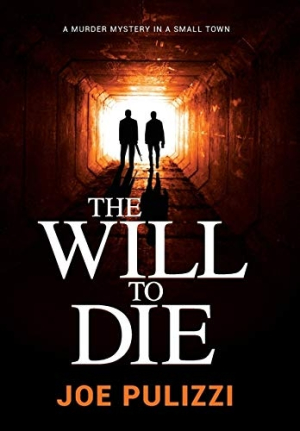The Will to Die
In the chilling murder mystery The Will to Die, grifters lurk at the edges of a tight-knit community, threatening its peace.
Corporate greed and racist proclivities direct Joe Pulizzi’s small-town murder mystery The Will to Die.
Will grew up like a ghost in his father’s mortuary, moving between strangers’ funerals in a state of unobserved fascination. In his adulthood, he makes sharper impressions as a freestyling marketing executive and a proud father. He shares a firm with his best friend, Robby. And in his free time, he struggles beneath gambling debts and because of his growing alcoholism.
When Will learns that his father has died, and that the circumstances around his death are suspicious, he returns to the Ohio suburb of his youth to grapple with his history and with the mysteries of the town. Coming home also means running into his ex-wife, Sam, who worked alongside his father at the funeral parlor. Will inherits the business, but cremations are up and the funeral home’s intake is down, and all of this spells trouble for the family’s future—even before Will realizes his town is being remade in someone’s nightmare image.
Fortunate reveals mean that Will doesn’t have to do much investigating; clues present themselves at a steady pace, and the horrifying motivations for the murders that are happening just beyond the public’s awareness are soon apparent. To protect those around him, Will has to expose a vile conspiracy headed by formidable foes.
Will is no easy hero. He’s a wry, sometimes crass, narrator, and his loose tongue leads to uncomfortable moments, especially where the family business is concerned. His occasional sullen behavior makes him less than sympathetic, despite the tragic circumstances that surround him. His ex-wife ends up being a far more commanding character: self-reliant and assertive, Sam demands the respect that she warrants and refuses to let Will either pout or shirk his duties.
Sam’s blunt tone infuses her exchanges with Will with color, but not all conversations are as engrossing. Will’s marketing exchanges with Robby, while they help to flesh both characters out as professionals, impede the book’s momentum. Details related to the funeral business have a similar effect: they clarify the environment, but are nonetheless stultifying. Still, Robby’s close relationship with Will and Sam leads to important, frank revelations where the mystery is concerned; when he’s not talking business, he injects both righteousness and humor into the text.
Though the novel begins as a family drama, its concerns are soon bigger than Will’s own strained relationships and lost father. Its horrors are developed in a suspenseful way, though there’s some melodrama involved in their reveals and in the novel’s climactic scenes. The book’s atrocities are made possible because seemingly good people in Will’s town opt to do nothing. Because the book’s injustices are so looming, the end of Will’s investigation brings satisfactions bigger than any one murder’s resolution.
In the creepy mystery The Will to Die, grifters and bigots lurk at the edges of a tight-knit community, threatening its peace; it will take a hometown hero to stop them.
Reviewed by
Michelle Anne Schingler
Disclosure: This article is not an endorsement, but a review. The publisher of this book provided free copies of the book and paid a small fee to have their book reviewed by a professional reviewer. Foreword Reviews and Clarion Reviews make no guarantee that the publisher will receive a positive review. Foreword Magazine, Inc. is disclosing this in accordance with the Federal Trade Commission’s 16 CFR, Part 255.

